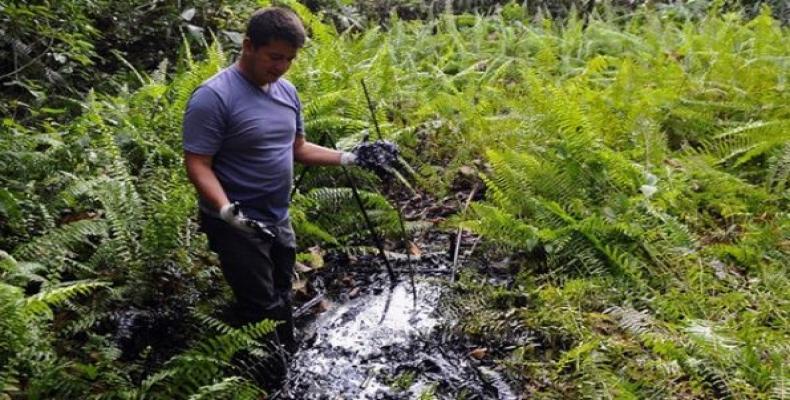Quito, June 23 (RHC-teleSUR)-- After finding no justice in the U.S. Supreme Court earlier in the week, Ecuador will continue its 25-year battle against U.S. oil giant Chevron overseas. The move aims to fulfill the demands of 80 Indigenous rural Ecuadoreans in the Amazon who accuse Texaco, since acquired by Chevron, of rendering their land toxic between 1964 and 1990.
The U.S. Supreme Court declined to hear arguments from the Ecuador-based Amazon Defense Coalition, which represents the plaintiffs, in a move that international human rights lawyer and environmentalist Steven Donziger called “a grave mistake and a sad reflection on the U.S. judiciary in the eyes of the world.”
Residents from Ecuador's Amazonian city of Lago Agrio brought the lawsuit against Texaco in 1993 in a U.S. federal court after swathes of the northeast rain-forest underwent decades of contamination while the company searched for oil. While the court dismissed the case, a decade later the lawsuit was restarted. By then, the Chevron Corporation had acquired Texaco, Inc.
In 2011, an Ecuadorean judge ordered the oil giant to pay $18.2 billion for "extensively polluting" the area. Ecuador's highest court upheld the verdict against Chevron in 2013 but reduced the amount of compensation to $9.5 billion. However, Chevron sued public Attorney Donziger on the grounds of alleged Racketeer Influenced and Corrupt Organizations Act, or RICO Act, violations that led to the Ecuadorian ruling.
Three years later in a case described by observers as “a shocking example of American judicial imperialism,” a U.S. federal court in Manhattan upheld Chevron's smears of the Ecuadoreans' counsel as a fraudulent lawyer who resorted to bribes and extortion to obtain the ruling, charges the attorney emphatically denies.
As a result of the U.S. Supreme Court's unwillingness to hear the case, thus blocking any ability to enforce the Ecuadorean rulings, Donziger has resorted to moving against Chevron in other countries.
In Canada, Donziger and his allies attempted to have Chevron's facilities seized and sold to fulfill the judgment, but in January, the judge ruled that the Canadian subsidiary of the oil company couldn't be held liable for the parent corporation's actions.
However, Donziger expects that his appeal of the ruling should be won this coming fall despite Chevron's “strategy to tie us up in procedural knots so the trial happens as far down the road as possible.”
The Ecuadoreans have also sought the enforcement of their country's judgment in the courts of Argentina, Brazil and the British territory of Gibraltar, but Chevron has stated that prosecutors in the two countries are urging courts not to recognize the judgment. Donziger has explained that while his team will keep up the fight in Brazil, “Argentina is in a state of abeyance for various reasons.” Gibraltar's Supreme Court likewise ruled against Donziger's efforts.
Regardless, the fight against Chevron will continue, and the Amazon Defense Coalition plans on collecting “every last dollar of the judgment imposed on it for is criminal behavior in Ecuador.
“In our view, the refusal of the Supreme Court to hear the case is a nothing more than a crass hometown decision in favor of the home team made by biased referees who could care less about the harm caused to Indigenous persons in the developing world by Chevron’s irresponsible oil extraction,” the coalition said. “Like many people and countries in Latin America, we are washing our hands of U.S. courts in terms of any hope of achieving environmental justice. Chevron will be held accountable elsewhere.”
Washing Hands of U.S. Supreme Court, Ecuador's Amazon Chevron Victims Seek Justice Abroad

Related Articles
Commentaries
MAKE A COMMENT
All fields requiredMore Views
- U.S. lawmakers propose withdrawing from United Nations, saying it no longer serves Washington's interests
- Remarkable Cuban educational experience
- Cuban Embassy in the U.S. celebrates African-American History Month
- “Cooperation between Cuba and the United States on Law Enforcement and Compliance: Evolution, Results and Limitations”
- OPEC chief says petroleum demand will rise despite global push for renewables

